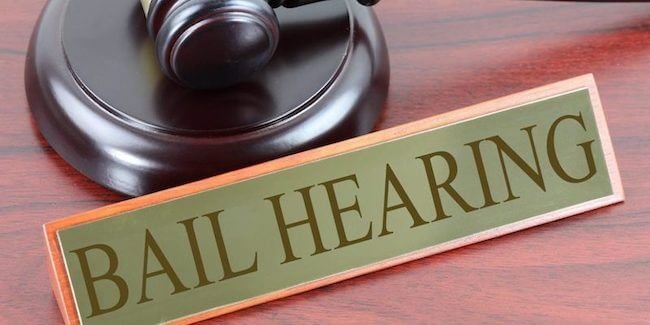Obtaining bail is an important part of the criminal process. If you or a loved one has been charged with a criminal offence, your rights not to be denied reasonable bail without just cause are protected under the Canadian Charter of Rights and Freedoms. After an arrest, the bail hearing provides the accused an opportunity to be released from custody. When you’re in this situation, it’s critical to understand your rights. When your reputation and freedom are on the line you want a lawyer, you can trust.
When Does an Accused Require a Bail Hearing?
In certain circumstances, police may release an individual without taking them into custody. The police may issue an appearance notice or release them on an undertaking to follow certain conditions.
If you have been charged with an offence and taken into custody, then you will require a bail hearing regardless of the charge to ensure you are released prior to trial. The general rule is that an accused must be brought before the court for a bail hearing within 24 hours of the arrest.
Types of Bails Hearings
A bail hearing is arranged once an individual is arrested and taken into custody. It determines whether the accused will be released from custody pending their trial.
There are two types of bail hearings: consent or contested.
- Consent Bail Hearing: When there is an agreement between the Crown and the defence to the terms of release and this is subsequently approved by the justice of the peace or a judge. A criminal lawyer will work with the accused to formulate a release plan and negotiate a consent release with the Crown. The advantage of consent release is that it can be done quickly, sometimes in as little as thirty minutes.
- Contested Bail Hearing: If the Crown does not agree to the bail plan put forward, a contested bail hearing will be necessary. At this stage, the Crown will present its position and a summary of the allegations. Any criminal record along with other related evidence will be tendered by the Crown. The defence will then have an opportunity to question the allegations and call witnesses including the surety. Following the conclusion of the evidence, the crown and defence will make submissions to support their positions. The judge will make a decision on whether to order the release of the accused or require his/her detention after both sides have completed their arguments.
Steps of a Bail Hearing
Step 1: Courthouse Visit
Within 24 hours of being arrested, an accused has the right to a bail hearing if a judge is available, or as soon as possible if one isn’t. You may be taken from the police station or the jail to the courthouse where you will be held in a cell or you may be linked to the court by a video screen. You will have a chance to speak with your lawyer as well.
Step 2: Bail Hearing
In the courtroom, the Crown will read out allegations against you. In some cases, the Crown will call a witness usually the investigating officer. It is the Crown’s job to show why you shouldn’t be allowed out on bail. Your lawyer will often call the potential surety (Surety is explained below) to the stand to convince the court that, if you’re released on bail, you will obey your bail conditions and come to your court dates.
Step 3: Decision
After considering the seriousness of the charges and evidence, the court will then decide to either release you on bail or keep you in jail while you wait for your trial.
If the court grants the bail: If you are released there will usually be conditions to do or not do certain things. It is very important that you follow the conditions exactly. If you do not, you will be charged with breaching a court order and be put back in jail.
If the court does not grant the bail: If you are not released, you may have an option to appeal the decision. Your lawyer or duty counsel can explain available options.
Reverse Onus
For more serious criminal charges, and in certain circumstances such as where you were already on bail, the bail hearing will be “reverse onus”.
Reverse onus means that the onus to show why the accused should be released is reversed from the crown to the accused. The accused will be held in custody unless the accused or their lawyer can satisfy to the court as to why they should be released.
The Justice may require that a bond or cash deposit as bail be placed by someone acting as a surety for the accused.
Many trials can last months or even years before they reach court, so call a lawyer to be properly represented at the bail hearing to avoid spending additional time in jail.
Reasons for Bail Being Denied
There are three general grounds upon which the Crown will seek to deny an accused bail. In broad terms, some of the reasons for being denied bail include:
- A risk that the accused will fail to attend court again
- A substantial danger or risk to the public
- There is a real potential that the accused will continue to break the law
- There is a real potential that the accused will interfere with witnesses
- An overwhelmingly strong Crown case where there is a potential for serious jail time
- The allegations are of such a nature that the public would be offended if the accused is released
When bail is granted to an accused person there are certain conditions to the recognizance of bail that they must follow. Failing to abide by bail conditions or recognizance of bail is a criminal offence. These conditions are offence-specific and can vary greatly depending on the charges and the risks posed by that specific offender.
What Is a Surety?
The surety will be responsible to ensure the accused follows the terms of their bail and attends court when they are required.
A surety is someone who puts up the bond (a promise to pay a set amount of money on behalf of the accused) at a bail hearing. This individual will be responsible to ensure the accused will be in attendance at court when they are required to and follow the conditions of their release. This person will also be financially responsible to pay the court the entire bond amount if the accused breaches any conditions of their release. A cash deposit may also be required in certain circumstances such as where the accused is not a resident of the province or resides 200 KM from the place in which they are charged.
Bail Review
A bail review occurs after a decision on bail is made by the court. This is normally the next course of action when an accused has been denied bail and wants to appeal the decision. The appeal is made to a higher court for review. This appeal works both ways and can be brought by either the Crown or the Defence to contest a decision made by the court.
We are committed to fighting for your rights at all stages of a criminal proceeding. Contact now at (844) 978-8444 and get a free immediate consultation.









